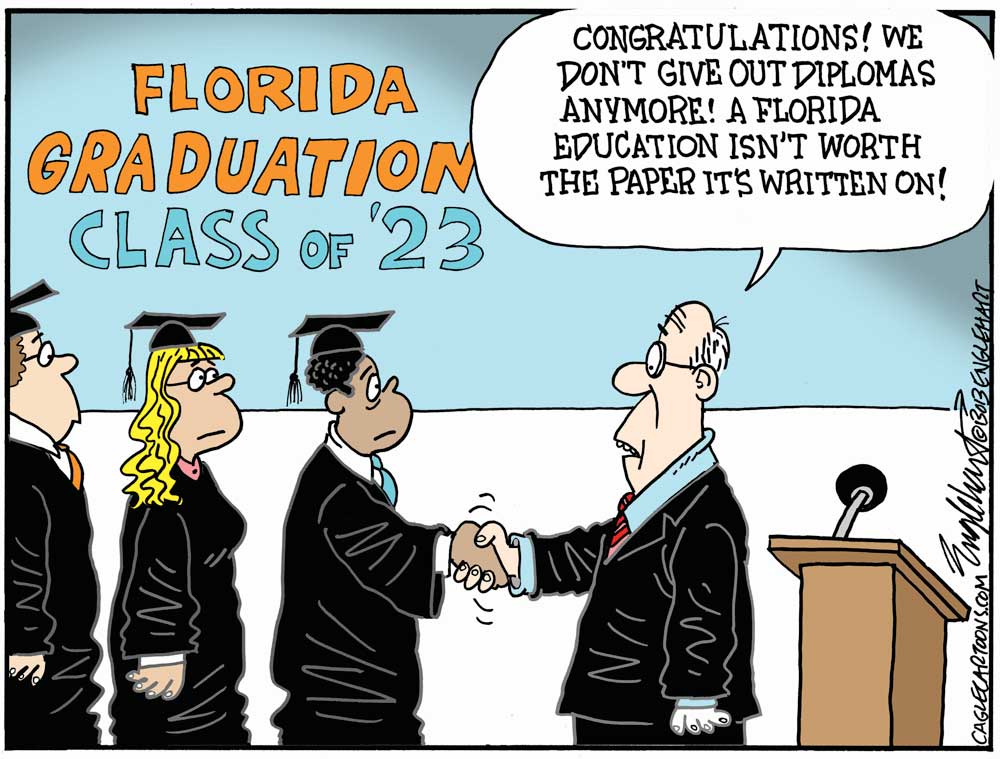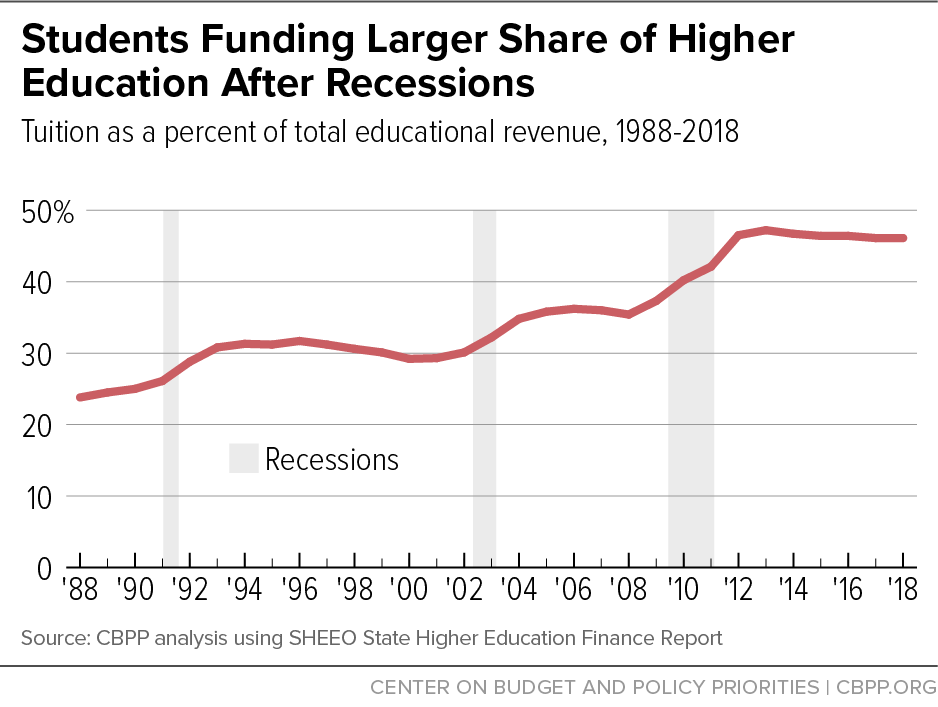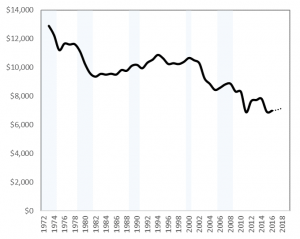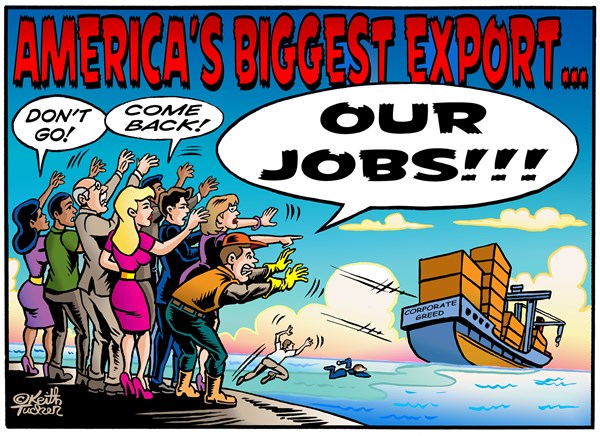
History gets a remake in Florida schools.
As Ron DeSantis’ Florida continues its descent into authoritarianism, you may have missed one of the summer’s developments: In late July, Florida approved PragerU Kids videos for use in Florida public schools.
What is PragerU? You can be forgiven for not knowing what PragerU Kids is. Prager University is well known among conservatives, but nearly invisible to the rest of us (until recently). Like the fraudulent and now defunct Trump University, it is not actually a university, as its FAQ admits:
No, PragerU is not an accredited university, nor do we claim to be. We do not offer degrees. However, we are the most accessible and influential online resource for explaining the concepts that have made America great.
That right there is a clue to the Prager style: It creates misperceptions, but takes no responsibility for them: We’re not a university, we just call ourselves one. If you jumped to the conclusion that we’re a reputable academic institution, that’s on you.
Elsewhere, it describes itself more explicitly:
As a 501(c)(3) nonprofit, Prager University Foundation (“PragerU”) offers a free alternative to the dominant left-wing ideology in culture, media, and education.
It spends about $20 million a year, and its funding comes from a variety of sources, including a long list of conservative family foundations, like the Bradley Foundation ($1.6 million), Dunn Foundation ($315K), Chillemi Charitable Fund ($316K), Leven Family Foundation ($300K), Mitchell Foundation ($1.2 million), Morgan Family Foundation ($470K), Thirteen Foundation ($3.25 million), and so on. It also gets money from other conservative groups like Turning Point USA ($500K) and National Christian Foundation ($1.7 million). Several millions come via organizations supervising what are called donor-advised funds (which are basically foundations for people who can’t afford the legal overhead of foundations — I have one myself) like Fidelity Charitable Gift Funds ($4.3 million).
In short, while Prager U has some big donors, it also has a fairly wide appeal among conservatives. Its pitch is that “left-wing ideology” is so “dominant” that an alternative conservative voice is needed. It’s pro-fossil-fuel, anti-anti-racist, pro-Christian-exceptionalist, and promotes a number of myths about American history, like soft-pedaling America’s role in the history of slavery. (Soft-pedaling slavery, as we’ll see, is a persistent theme. This is probably a big reason it appeals to DeSantis’ people.)
In short, if you’re arguing the conservative side of just about any culture-war issue, you can add some intellectual trappings to your case by citing a PragerU video. Your friends and family will probably be fooled into taking the “university” thing seriously. (But that’s their fault, not Prager’s.)
PragerU Kids, as the name suggests, is the same thing aimed at children. If you’re a conservative home-schooling your kids, or an explicitly conservative private school, you probably use a lot of these videos. They’re propaganda, but like all the best propaganda, they usually don’t explicitly lie. PragerU Kids videos cherry-pick sources, conveniently overlook events that don’t fit their chosen narrative, and frame facts in deceptive ways, but they’re usually based on something. (If pressed, I suspect most PragerU folks would claim that they’re just using the same deceptive tactics liberals use.)
Just to be clear where I’m coming from, I think PragerU has every right to do what it does, and anybody who wants to view their videos (or show them to their kids) should be allowed to do so. I could even see a public-school system making some of these videos available to older children in a multi-viewpoint class that has the time and resources to provide and discuss the videos’ missing context. But for a public school teacher to show third-graders one of these videos and then send them home (as I imagine will frequently happen in Florida) is educational malpractice. It is precisely the kind of indoctrination that Governor DeSantis claims to oppose.

How does Frederick Douglass get into this? Two of PragerU Kids’ most popular characters are Leo and Layla, a brother and sister who somehow have a time-travel app on their phone. To a certain extent the app has a mind of its own, so when the kids are wondering about something in the present, they frequently get zapped back in time so that some famous historical figure can teach them the proper conservative culture-war lesson.
In one video, they are watching the news on TV, and seeing events that are clearly meant to evoke the demonstrations that followed George Floyd’s murder by a Minneapolis policeman. The murder, however, is one of those inconvenient details best omitted, so the kids see only TV commentators making excuses for “violence and destruction by some of our angrier activists” who want to “abolish the police” and “want the US system torn down” for no apparent reason.
Wondering what “abolish” even means, the kids go back in time to explore abolitionists, and meet Frederick Douglass in 1852.
Now, you might wonder why a conservative organization would want kids to talk to Douglass, who said some pretty radical things. For example, when asked to speak at a Fourth of July celebration in Rochester, New York in that very year of 1852, he questioned whether the holiday should mean anything at all to a Black man.
Fellow-citizens, pardon me, allow me to ask, why am I called upon to speak here to-day? What have I, or those I represent, to do with your national independence? Are the great principles of political freedom and of natural justice, embodied in that Declaration of Independence, extended to us? and am I, therefore, called upon to bring our humble offering to the national altar, and to confess the benefits and express devout gratitude for the blessings resulting from your independence to us?
Would to God, both for your sakes and ours, that an affirmative answer could be truthfully returned to these questions! Then would my task be light, and my burden easy and delightful. For who is there so cold, that a nation’s sympathy could not warm him? Who so obdurate and dead to the claims of gratitude, that would not thankfully acknowledge such priceless benefits? Who so stolid and selfish, that would not give his voice to swell the hallelujahs of a nation’s jubilee, when the chains of servitude had been torn from his limbs? I am not that man. In a case like that, the dumb might eloquently speak, and the ‘lame man leap as an hart.’
But such is not the state of the case. I say it with a sad sense of the disparity between us. I am not included within the pale of glorious anniversary! Your high independence only reveals the immeasurable distance between us. The blessings in which you, this day, rejoice, are not enjoyed in common. The rich inheritance of justice, liberty, prosperity and independence, bequeathed by your fathers, is shared by you, not by me. The sunlight that brought light and healing to you, has brought stripes and death to me. This Fourth July is yours, not mine. You may rejoice, I must mourn.
The Frederick Douglass who made that speech fits right into a class Florida would ban as “critical race theory”.
But that’s not what he says to Leo and Layla. The reason 1852 matters is that Douglass split with his former mentor, White abolitionist William Lloyd Garrison, in 1851. So in this video, Garrison (who is briefly portrayed when Douglass talks about him, but doesn’t get a speaking role) represents the violent extremists and Douglass the activists who patiently work within the system.
So Prager-Douglass opposes slavery, but repeats the soft-pedaling line that Prager and DeSantis favor: “The sad fact is that slavery has existed everywhere in the world for thousands of years.” (In a different video, Christopher Columbus tells the kids that “Slavery is as old as time, and has taken place in every corner of the world.”) In fine PragerU fashion, Douglass says something misleading that is carefully worded enough to be arguably true: “There was no real movement anywhere in the world to abolish slavery before the American founding. Slavery was part of life all over the world.”
Of course, France would abolish slavery in 1794 and the British Empire in 1831. Mexico’s version of the Emancipation Proclamation came in 1829, and was a major reason Texans sought independence. (The Texas Revolution was a fight for slavery, not freedom.) So the video’s assertion about 1787 (when the Constitution was adopted) might pass muster, assuming that you don’t consider the English Quakers a “real” movement. But waiting until 1865 to renounce slavery put the US near the end of the abolition process, not the beginning. Brazil would be the last major country to abolish slavery in 1888.
Prager-Douglass goes on: “Our founding fathers knew that slavery was evil and wrong” and “They wanted it to end. But their first priority was getting all 13 colonies to unite as one country.” So they tolerated slavery as “a compromise to achieve something great. … Our founders created a system they thought would have slavery end gradually.” And yes, slavery still hadn’t ended by 1852, but “complicated problems take time to solve.”
And that brings us to Prager-Douglass’ disagreement with Garrison. He says that Garrison “refuses all compromises, demands immediate change, and if he doesn’t get what he wants, he likes to set things on fire.” (What Garrison set on fire was a copy of the Constitution, which you can recognize in the video if you already know that story. If you jumped to the conclusion that he did actual property damage, like the violent demonstrators the kids had seen on TV, that’s on you, not Prager.) Prager-Douglass says he wants to work within the American system, but that Garrison wants to overturn it.

Layla tells Douglass that his way is definitely better, and says that in our time Douglass is an American hero “and that other guy isn’t really known”. (The picture shows Garrison’s statue in Newburyport, Massachusetts.) The kids are triumphalist about the present-day US: All Americans have equal voting rights, and a Black man was even elected president! (There is, of course, no point in mentioning that his administration was followed by a racist backlash, or that people might still be protesting about racial grievances.)
Prager-Douglass asks if we still have the same Constitution, and then says “I knew the US Constitution would survive and allow for positive change.” Prager-Douglass closes by advising the kids to seek change within the system, and to avoid “radicals” like Garrison (and presumably Black Lives Matter).
Who is this guy? You may have a hard time recognizing the PragerU cartoon character as the Frederick Douglass you know from history. After all, by late 1860, Douglass was promoting far more than just gradual change within the system. Speaking on the first anniversary of John Brown’s execution, he endorsed violence: “We need not only to appeal to the moral sense of these slaveholders; we have need, and a right, to appeal to their fears.”
I rejoice in every uprising at the South. Although the men may be shot down, they may be butchered upon the spot, the blow tells, notwithstanding, and cannot but tell. Slaveholders sleep more uneasily than they used to. They are more careful to know that the doors are locked than they formerly were. They are more careful to know that their bowie-knives are sharp; they are more careful to know that their pistols are loaded. This element will play its part in the abolition of slavery.
And his endorsement of the Union was conditional.
My opinion is that if we only had an abolition President to hold these men in the Union and execute the declared provisions of the Constitution, execute that part of the Constitution which is in favor of liberty, as well as put upon those passages which have been construed in favor of slavery, a construction different from that and more in harmony with the principles of eternal justice that lie at the foundation of the government — if we could have such a government, a government that would force the South to behave herself, under those circumstances I should be for the continuance of the Union. If, on the contrary — no if about it — we have what we have, I shall be glad of the news, come when it will, that the slave States are an independent government, and that you are no longer called upon to deliver fugitive slaves to their masters, and that you are no longer called upon to shoulder your arms and guard with your swords those States — no longer called to go into them to put down John Brown, or anybody else who may strike for liberty there.
That doesn’t sound at all like the PragerU cartoon character. So are they lying to the kids?
Not exactly. The PragerU Douglass seems to be based on a particular aspect of Douglass’ thinking during a particular point in his life. During the 1850s, Douglass and Garrison had a very public argument that centered on whether to give up on the American experiment in democracy.
Garrison saw little hope for it. Slavery, in his view, was part and parcel of the Union from Day 1. The word slave may not appear in the Constitution, but the shadow of slavery darkens many of its provisions, from the 3/5ths compromise to the requirement that states return those who were “held to Service or Labor” in another state. The Constitution, in his view, was a “covenant with death” and “an agreement with Hell”. Consequently, he refused to participate in electoral politics and wanted free states to secede. “No Union with Slaveholders” was his slogan.
Douglass explained his contrary view in a speech he gave in Scotland.
I, on the other hand, deny that the Constitution guarantees the right to hold property in man, and believe that the way to abolish slavery in America is to vote such men into power as well use their powers for the abolition of slavery.
Douglass held that the Constitution had been given a pro-slavery interpretation, and the US government had implemented pro-slavery policies, but he denied that the Constitution itself was at fault. In the Scotland speech, (given in March, 1860, a mere seven months before the John Brown speech I quoted earlier), he insisted that free states should stay in the Union precisely so that they could fight against slavery.
This is why today Douglass can be turned to the service of conservatives, particularly the ones like DeSantis, who want to deny that racism played (and continues to play) a structural role in the US. By cherry-picking, Douglass’ words can be put to use in much the same way that Martin Luther King’s famous quote that people “not be judged by the color of their skin but by the content of their character” is regularly trotted out in opposition to affirmative action (which King supported).
Restoring the context. The video would have you believe that history has proven Douglass right and Garrison wrong, because the Constitution and the Union have both survived, but slavery hasn’t.
However, that result didn’t happen through ordinary Constitutional processes, i.e., by convincing voters and electing abolitionist candidates, as Douglass envisioned. Instead, change came about through violence: The Southern states seceded, the North conquered them, and then in the aftermath of the war, the North imposed abolition, essentially ratifying the 13th Amendment at gunpoint.
The election of Lincoln, which precipitated the crisis, was more the result of slaveholder miscalculation than a groundswell of abolitionist feeling among American voters. As historian Douglas Egerton described the unlikely outcome of 1860 election in his book Year of Meteors, the Democratic coalition of slaveholders and Northern industrialists that had controlled the White House in 1852 and 1856 was well set up to do it again in 1860. But pro-secession Southerners revolted against nominating Northerner Stephen Douglas, split the party, and virtually guaranteed Lincoln’s victory with 40% of the popular vote in a four-candidate field.
If abolition had waited for an anti-slavery voting majority, we might still be waiting.
So history proved neither Douglass nor Garrison right, because neither of their strategies worked. In the end, the slaveholders were not outplayed by their opponents; they simply overreached and lost everything.
If you can find a Black-Lives-Matter lesson in this, you’re cleverer than I am.
Conclusion. So I, an adult with a college education and the time and interest to pursue the matter, was able to find the kernel of truth behind the PragerU Kids video and put it in some proper context. But can we really expect kids Leo’s age — the target audience of the Leo & Layla videos — to do the same?
Florida either thinks we can, or it’s content to let its children be indoctrinated.

















 Sociologist Arlie Russell Hochschild started studying the Trump base years before anybody knew they’d be the Trump base. In her book
Sociologist Arlie Russell Hochschild started studying the Trump base years before anybody knew they’d be the Trump base. In her book  The University of Chicago, where I did my graduate work in the late 1970s and early 80s, doesn’t make headlines all that often. It’s been a top academic institution for more than a century, but hasn’t had a great sports team since
The University of Chicago, where I did my graduate work in the late 1970s and early 80s, doesn’t make headlines all that often. It’s been a top academic institution for more than a century, but hasn’t had a great sports team since 